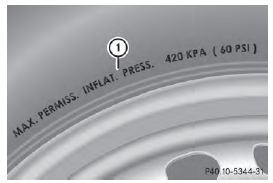Underinflated or overinflated tires
WARNING
Tires with pressure that is too low can overheat and burst as a consequence. In addition, they also suffer from excessive and/ or irregular wear, which can severely impair the braking properties and the driving characteristics. There is a risk of an accident.
Avoid tire pressures that are too low in all the tires, including the spare wheel.
Underinflated tires may:
Х overheat, leading to tire defects
Х have an adverse effect on handling
characteristics
Х wear quickly and unevenly
Х have an adverse effect on fuel consumption
Overinflation
WARNING
Tires with excessively high pressure can burst because they are damaged more easily by road debris, potholes etc. In addition, they also suffer from irregular wear, which can severely impair the braking properties and the driving characteristics. There is a risk of an accident.
Avoid tire pressures that are too high in all the tires, including the spare wheel.
Overinflated tires may:
Х increase the braking distance
Х have an adverse effect on handling
characteristics
Х wear quickly and unevenly
Х have an adverse effect on ride comfort
Х be more susceptible to damage
Maximum tire pressures

1 Example: maximum permissible tire pressure
Never exceed the maximum permissible tire inflation pressure. Always observe the recommended tire pressure for your vehicle when adjusting the tire pressure .
The actual values for tires are vehiclespecific and may deviate from the values in the illustration.
See also:
Flat tire
You can find information on what to do in the event of a flat tire in the
"Breakdown assistance" section .
Information on driving with MOExtended tires in the event of a flat tire ...
Pulling away
Automatic transmission
WARNING
If the engine speed is above the idling speed
and you engage transmission position D or
R, the vehicle could pull away suddenly. There
is a risk of an accident.
...
Fuse box in the transmission tunnel
Make sure that no moisture can enter the
fuse box when the cover is open.
When closing the cover, make sure that it
is lying correctly on the fuse box. Moisture
seeping in or dirt could otherwis ...
